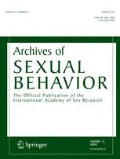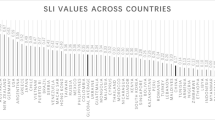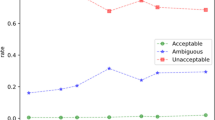Abstract
Although the majority of the Chinese general public remains unaccepting of same-sex sexual behaviors, results from multiple waves of the Chinese General Social Survey have shown a substantial change in the public tolerance for same-sex sexual behaviors between 2010 and 2017. Using logistic regression models and decomposition analysis, the current study revealed that while changes in the changes in the demographic predictors (e.g., cohort succession and improved education) contributed to some of the attitudinal change, changes in the predictor coefficients explained most of the attitudinal change. Specifically, the Internet historically played a critical role in shaping pro-LGBTQ consciousness in China, but its effect has diminished over time. Socioeconomic factors such as education and household registration status (i.e., urban versus rural origin) have gained statistical significance and effect size in their prediction of public tolerance. Policy and advocacy implications of the findings are also discussed.
Similar content being viewed by others
References
Adamczyk, A., & Pitt, C. (2009). Shaping attitudes about homosexuality: The role of religion and cultural context. Social Science Research, 38(2), 338–351.
Althauser, R. P., & Wigler, M. (1972). Standardization and component analysis. Sociological Methods and Research, 1(1), 97–135.
Andersen, R., & Fetner, T. (2008). Cohort differences in tolerance for homosexuality: Attitudinal change in Canada and the United States, 1981–2000. Public Opinion Quarterly, 72(2), 311–330.
Baunach, D. M. (2011). Decomposing trends in attitudes toward gay marriage, 1988–2006. Social Science Quarterly, 92(2), 346–363.
Baunach, D. M. (2012). Changing same-sex marriage attitudes in America from 1988 through 2010. Public Opinion Quarterly, 76(2), 364–378.
Becker, A. B. (2012). Determinants of public support for same-sex marriage: Generational cohorts, social contact, and shifting attitudes. International Journal of Public Opinion Research, 24(4), 524–533.
Becker, A. B., & Scheufele, D. A. (2009). Moral politicking: Public attitudes toward gay marriage in an election context. The International Journal of Press/politics, 14(2), 186–211.
Blinder, A. S. (1973). Wage discrimination: Reduced form and structural estimates. Journal of Human Resources, 8(4), 436–455.
Cao, H., Wang, P., & Gao, Y. (2010). A survey of Chinese university students’ perceptions of and attitudes towards homosexuality. Social Behavior and Personality: An International Journal, 38(6), 721–728.
Chan, K. W. (2009). The Chinese hukou system at 50. Eurasian Geography and Economics, 50(2), 197–221.
Chau, A. Y. (2011). Introduction: Revitalizing and innovating religious traditions in contemporary China. In A. Y. Chau (Ed.), Religion in contemporary China: Revitalization and innovation. Routledge.
Chen, S., Dai, X., Li, S., & Ji, H. (2008). A survey on public attitude toward homosexuality in Wuhan. The Chinese Journal of Human Sexuality, 17(8), 11–15.
Cheng, Y. H. A., Wu, F. C. F., & Adamczyk, A. (2016). Changing attitudes toward homosexuality in Taiwan, 1995–2012. Chinese Sociological Review, 48(4), 317–345.
Collier, K. L., Bos, H. M., & Sandfort, T. G. (2012). Intergroup contact, attitudes toward homosexuality, and the role of acceptance of gender non-conformity in young adolescents. Journal of Adolescence, 35(4), 899–907.
Cox, D., Navarro-Rivera, J., & Jones, R. P. (2014). A shifting landscape: A decade of change in American attitudes about same-sex marriage and LGBT issues. Public Religion Research Institute.
Detenber, B. H., Cenite, M., Zhou, S., Malik, S., & Neo, R. L. (2014). Rights versus morality: Online debate about decriminalization of gay sex in Singapore. Journal of Homosexuality, 61(9), 1313–1333.
Fairlie, R. W. (2005). An extension of the Blinder-Oaxaca decomposition technique to logit and probit models. Journal of Economic and Social Measurement, 30(4), 305–316.
Fu, X., Suningmuqier, Liu, A., & Fan, H. (2012). An investigation of college students’ cognition and attitude to homosexuality and substantial research. The Chinese Journal of Human Sexuality, 21(7), 22–51.
Hadler, M. (2012). The influence of world societal forces on social tolerance. A time comparative study of prejudices in 32 countries. The Sociological Quarterly, 53(2), 211–237.
Heinze, J. E., & Horn, S. S. (2009). Intergroup contact and beliefs about homosexuality in adolescence. Journal of Youth and Adolescence, 38(7), 937–951.
Herek, G. M. (1984). Beyond “homophobia”: A social psychological perspective on attitudes toward lesbians and gay men. Journal of Homosexuality, 10(1–2), 1–21.
Hu, K., & Li, X. (2019). The effects of media use and traditional gender role beliefs on tolerance for homosexuality in China. Chinese Sociological Review, 51(2), 147–172.
Hu, X., & Wang, Y. (2013). LGB identity among young Chinese: The influence of traditional culture. Journal of Homosexuality, 60(5), 667–684.
Human Rights Watch. (2020). World Report 2020. Seven Stories Press. Retrieved on July 3, 2020 from https://www.hrw.org/sites/default/files/world_report_download/hrw_world_report_2020_0.pdf
Jeffreys, E. (2018). Public policy and LGBT people and activism in mainland China. In W. Lam (Ed.), Routledge handbook of the Chinese communist party (pp. 283–296). Routledge.
Kang, W. (2012). The decriminalization and depathologization of homosexuality in China. In T. B. Weston & L. M. Jensen (Eds.), China in and beyond the headlines (pp. 231–248). Rowman and Littlefield.
Lemm, K. M. (2006). Positive associations among interpersonal contact, motivation, and implicit and explicit attitudes toward gay men. Journal of Homosexuality, 51(2), 79–99.
Li, Y., & Zheng, H. (2013). Public attitudes toward homosexuality and its predictors. Journal of South China Normal University (Social Science Edition), 6, 31–36.
Lin, K., Button, D. M., Su, M., & Chen, S. (2016). Chinese college students’ attitudes toward homosexuality: Exploring the effects of traditional culture and modernizing factors. Sexuality Research and Social Policy, 13(2), 158–172.
Loftus, J. (2001). America’s liberalization in attitudes toward homosexuality, 1993–1998. American Sociological Review, 66, 762–782.
Oaxaca, R. (1973). Male-female wage differentials in urban labor markets. International Economic Review, 14(3), 693–709.
Parkin, S. (2017). LGBT rights-focused legal advocacy in China: The promise, and limits, of litigation. Fordham International Law Journal, 41, 1243.
Roper, E. A., & Halloran, E. (2007). Attitudes toward gay men and lesbians among heterosexual male and female student-athletes. Sex Roles, 57(11–12), 919–928.
Sinning, M., Hahn, M., & Bauer, T. K. (2008). The Blinder-Oaxaca decomposition for nonlinear regression models. The Stata Journal, 8(4), 480–492.
Smith, T. W. (2011). Cross-National Differences in Attitudes towards Homosexuality. UCLA: The Williams Institute. Retrieved on July 25, 2014 from: https://escholarship.org/uc/item/81m7x7kb
Tan, K., Yan, F., Qiu, Y., Chen, B., & Beckum, L. (2012). Attitudes of university students toward homosexuals in Xiamen city, Fujian province. Chinese Journal of Health Education, 28(7), 524–528.
Taylor, M. (2019). China urged to take action on LGBT+ rights after backing U.N. changes. Reuters. Retrieved on April 20th, 2021 from https://www.reuters.com/article/us-china-lgbt-un/china-urged-to-take-action-on-lgbt-rights-after-backing-u-n-changes-idUSKCN1QO1MU
The World Bank. (2017). Individuals using the Internet (% of population) – China. World Bank DataBank. Retrieved from https://data.worldbank.org/indicator/IT.NET.USER.ZS?locations=CN
Tian, H., Ma, S., & Fan, C. (2011). Cognition and attitude toward homosexuality of university students in Guangzhou. Chinese Journal of School Health, 32(1), 24–26.
Tu, J. W., & Lee, T. T. (2014). The effects of media usage and interpersonal contacts on the stereotyping of lesbians and gay men in China. Journal of Homosexuality, 61(7), 980–1002.
UNDP. (2016). Being LGBTI in China – A national survey on social attitudes towards sexual orientation, gender identity and gender expression. United Nations Development Program. Retrieved from https://www.asia-pacific.undp.org/content/rbap/en/home/library/democratic_governance/hiv_aids/being-lgbti-in-china--a-national-survey-on-social-attitudes-towa.html
UNESCO. (2021). Education: National monitoring. Retrieved from http://data.uis.unesco.org/
Wang, Z., & You, Y. (2016). The arrival of critical citizens: Decline of political trust and shifting public priorities in China. International Review of Sociology, 26(1), 105–124.
World Value Survey Association (WVSA). (2014). World Value Survey Wave 6: 2010–2014. WVSA. Retrieved on July 2, 2020 from http://www.worldvaluessurvey.org/WVSOnline.jsp
Worthen, M. G., Lingiardi, V., & Caristo, C. (2017). The roles of politics, feminism, and religion in attitudes toward LGBT individuals: A cross-cultural study of college students in the USA, Italy, and Spain. Sexuality Research and Social Policy, 14(3), 241–258.
Xie, Y., & Peng, M. (2018). Attitudes toward homosexuality in China: Exploring the effects of religion, modernizing factors, and traditional culture. Journal of Homosexuality, 65(13), 1758–1787.
Yang, G. (2009). The power of the internet in China: Citizen activism online. Columbia University Press.
Yi, Y., Cheng, Y., & Liu, X. (2010). An investigation of gender difference in attitudes towards homosexuality among college students in Qiqihar city. Journal of Qiqihar Medical College, 31(8), 1261–1262.
Yu, Y., Xiao, S., Wang, X., & Sun, Z. (2010). Two college students’ attitudes toward lesbians and gay men in Changsha. Chinese Journal of Clinical Psychology, 18(3), 369–371.
Zhang, H., Sun, T., & Wang, P. (2008). An investigation of college students’ cognition and attitude to homosexuality. Chinese Journal of Human Sexuality, 17(9), 9–12.
Zheng, W., Zhou, X., Zhou, C., Liu, W., Li, L., & Hesketh, T. (2011). Detraditionalisation and attitudes to sex outside marriage in China. Culture, Health and Sexuality, 13(5), 497–511.
Author information
Authors and Affiliations
Corresponding author
Ethics declarations
Conflict of Interest
The authors declare they have no conflict of interest.
Ethical Approval
Human subjects protection were acquired and approved by the Chinese General Social Survey.
Informed consent
Informed consent were acquired and approved by the Chinese General Social Survey.
Additional information
Publisher's Note
Springer Nature remains neutral with regard to jurisdictional claims in published maps and institutional affiliations.
Rights and permissions
About this article
Cite this article
Lin, K., Wang, W. Changing Public Tolerance for Same-Sex Sexual Behaviors in China, 2010–2017: A Decomposition Analysis. Arch Sex Behav 50, 3433–3445 (2021). https://doi.org/10.1007/s10508-021-02080-y
Received:
Revised:
Accepted:
Published:
Issue Date:
DOI: https://doi.org/10.1007/s10508-021-02080-y




